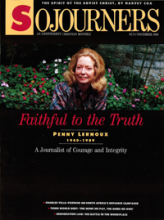I met Michael Harrington only once. We were picked up together at Chicago's O'Hare airport and driven into the city to speak at a conference. In the slow afternoon traffic we had a good chance to talk.
Several months later I became quite grateful for that ride and the rush-hour traffic when I heard the news that Michael Harrington had died of cancer on July 31.
The first thing we talked about that day on the Chicago freeways was Dorothy Day, the founder of the Catholic Worker movement, who had made such a deep impression on both of our lives. Harrington had joined the Catholic Worker in the early 1950s, and it was with the Catholic Worker newspaper that he really got his start as a writer. It was the clear commitment to the poor and oppressed that drew him to Dorothy Day and her work. Though he eventually left the church, his experience at the Worker was very formative and set him in a direction from which he never departed. As he told old stories about Dorothy, I could sense the deep love and indebtedness he still felt for the great woman and the community he had known.
We got into a discussion about religion, and Harrington shared his problem with "belief." The social implications of the gospel were perfectly clear to him (more clear than they are to many Christians), but philosophical and theological questions had become for him a stumbling block.
Nevertheless, in our conversation and at the weekend conference, Harrington challenged the religious to be unswerving in their faith and practice and never to water down their beliefs to accommodate secular sensibilities. We need religious people to be religious, he believed. Harrington exhorted people of faith to exemplify the very best of their tradition.
Read the Full Article

